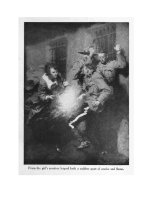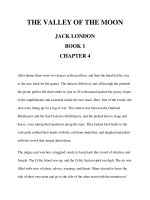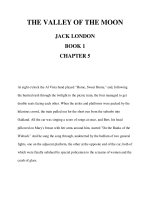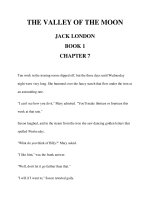The lily of the valley
Bạn đang xem bản rút gọn của tài liệu. Xem và tải ngay bản đầy đủ của tài liệu tại đây (1.04 MB, 219 trang )
TheProjectGutenbergEBookofTheLilyoftheValley,byHonoredeBalzac
ThiseBookisfortheuseofanyoneanywhereatnocostandwith
almostnorestrictionswhatsoever.Youmaycopyit,giveitawayor
re-useitunderthetermsoftheProjectGutenbergLicenseincluded
withthiseBookoronlineatwww.gutenberg.org
Title:TheLilyoftheValley
Author:HonoredeBalzac
Translator:KatharinePrescottWormeley
ReleaseDate:February26,2010[EBook#1569]
LastUpdated:November22,2016
Language:English
***STARTOFTHISPROJECTGUTENBERGEBOOKTHELILYOFTHEVALLEY***
ProducedbyJohnBickers,andDagny,andDavidWidger
THELILYOFTHEVALLEY
ByHonoreDeBalzac
TranslatedbyKatharinePrescottWormeley
DEDICATION
ToMonsieurJ.B.Nacquart,
MemberoftheRoyalAcademyofMedicine.
DearDoctor—Hereisoneofthemostcarefullyhewnstonesinthe
secondcourseofthefoundationofaliteraryedificewhichIhave
slowlyandlaboriouslyconstructed.Iwishtoinscribeyourname
uponit,asmuchtothankthemanwhosescienceoncesavedmeas
tohonorthefriendofmydailylife.
DeBalzac.
Contents
THELILYOFTHEVALLEY
CHAPTERI.
TWOCHILDHOODS
CHAPTERII. FIRSTLOVE
CHAPTERIII. THETWOWOMEN
ADDENDUM
THELILYOFTHEVALLEY
ENVOI
FelixdeVandenessetoMadamelaComtesseNataliedeManerville:
Iyieldtoyourwishes.Itistheprivilegeofthewomenwhomwe
lovemorethantheyloveustomakethemenwholovethemignore
theordinaryrulesofcommon-sense.Tosmooththefrownupontheir
brow,tosoftenthepoutupontheirlips,whatobstacleswe
miraculouslyovercome!Weshedourblood,weriskourfuture!
Youexactthehistoryofmypastlife;hereitis.Butremember
this,Natalie;inobeyingyouIcrushunderfootareluctance
hithertounconquerable.Whyareyoujealousofthesuddenreveries
whichovertakemeinthemidstofourhappiness?Whyshowthe
prettyangerofapettedwomanwhensilencegraspsme?Couldyou
notplayuponthecontradictionsofmycharacterwithoutinquiring
intothecausesofthem?Aretheresecretsinyourheartwhich
seekabsolutionthroughaknowledgeofmine?Ah!Natalie,youhave
guessedmine;anditisbetteryoushouldknowthewholetruth.
Yes,mylifeisshadowedbyaphantom;awordevokesit;ithovers
vaguelyabovemeandaboutme;withinmysoularesolemnmemories,
buriedinitsdepthslikethosemarineproductionsseenincalmest
weatherandwhichthestormsofoceancastinfragmentsonthe
shore.
Thementallaborwhichtheexpressionofideasnecessitateshas
revivedtheold,oldfeelingswhichgivemesomuchpainwhenthey
comesuddenly;andifinthisconfessionofmypasttheybreak
forthinawaythatwoundsyou,rememberthatyouthreatenedto
punishmeifIdidnotobeyyourwishes,anddonot,therefore,
punishmyobedience.Iwouldthatthis,myconfidence,might
increaseyourlove.
Untilwemeet,
Felix.
CHAPTERI.TWOCHILDHOODS
Towhatgeniusfedontearsshallwesomedayowethatmosttouchingofall
elegies,—the tale of tortures borne silently by souls whose tender roots find
stony ground in the domestic soil, whose earliest buds are torn apart by
rancorous hands, whose flowers are touched by frost at the moment of their
blossoming?Whatpoetwillsingthesorrowsofthechildwhoselipsmustsucka
bitterbreast,whosesmilesarecheckedbythecruelfireofasterneye?Thetale
thattellsofsuchpoorhearts,oppressedbybeingsplacedaboutthemtopromote
the development of their natures, would contain the true history of my
childhood.
What vanity could I have wounded,—I a child new-born? What moral or
physicalinfirmitycausedbymother’scoldness?WasIthechildofduty,whose
birthisamerechance,orwasIonewhoseverylifewasareproach?Puttonurse
inthecountryandforgottenbymyfamilyforoverthreeyears,Iwastreatedwith
suchindifferenceonmyreturntotheparentalroofthateventheservantspitied
me.IdonotknowtowhatfeelingorhappyaccidentIowedmyrescuefromthis
firstneglect;asachildIwasignorantofit,asamanIhavenotdiscoveredit.Far
fromeasingmylot,mybrotherandmytwosistersfoundamusementinmaking
me suffer. The compact in virtue of which children hide each other’s
peccadilloes,andwhichearlyteachesthemtheprinciplesofhonor,wasnulland
void in my case; more than that, I was often punished for my brother’s faults,
without being allowed to prove the injustice. The fawning spirit which seems
instinctiveinchildrentaughtmybrotherandsisterstojoininthepersecutionsto
whichIwassubjected,andthuskeepinthegoodgracesofamotherwhomthey
fearedasmuchasI.Wasthispartlytheeffectofachildishloveofimitation;was
it from a need of testing their powers; or was it simply through lack of pity?
Perhapsthesecausesunitedtodeprivemeofthesweetsoffraternalintercourse.
Disinherited of all affection, I could love nothing; yet nature had made me
loving. Is there an angel who garners the sighs of feeling hearts rebuffed
incessantly?Ifinmanysuchheartsthecrushedfeelingsturntohatred,inmine
they condensed and hollowed a depth from which, in after years, they gushed
forthuponmylife.Inmanycharactersthehabitoftremblingrelaxesthefibres
and begets fear, and fear ends in submission; hence, a weakness which
emasculates aman, andmakeshimmoreorlessaslave.Butinmycasethese
perpetualtorturesledtothedevelopmentofacertainstrength,whichincreased
through exercise and predisposed my spirit to the habit of moral resistance.
Alwaysinexpectationofsomenewgrief—asthemartyrsexpectedsomefresh
blow—my whole being expressed, I doubt not, a sullen resignation which
smothered the grace and gaiety of childhood, and gave me an appearance of
idiocy which seemed to justify my mother’s threatening prophecies. The
certainty of injustice prematurely roused my pride—that fruit of reason—and
thus, no doubt, checked the evil tendencies which an education like mine
encouraged.
ThoughmymotherneglectedmeIwassometimestheobjectofhersolicitude;
sheoccasionallyspokeofmyeducationandseemeddesirousofattendingtoit
herself.ColdchillsranthroughmeatsuchtimeswhenIthoughtofthetorturea
dailyintercoursewithherwouldinflictuponme.IblessedtheneglectinwhichI
lived,andrejoicedthatIcouldstayaloneinthegardenandplaywiththepebbles
and watch the insects and gaze into the blueness of the sky. Though my
loneliness naturally led me to reverie, my liking for contemplation was first
arousedbyanincidentwhichwillgiveyouanideaofmyearlytroubles.Solittle
noticewastakenofmethatthegovernessoccasionallyforgottosendmetobed.
One evening I was peacefully crouching under a fig-tree, watching a star with
thatpassionofcuriositywhichtakespossessionofachild’smind,andtowhich
myprecociousmelancholygaveasortofsentimentalintuition.Mysisterswere
playingaboutandlaughing;Iheardtheirdistantchatterlikeanaccompaniment
to my thoughts. After a while the noise ceased and darkness fell. My mother
happened to notice my absence. To escape blame, our governess, a terrible
Mademoiselle Caroline, worked upon my mother’s fears,—told her I had a
horrorofmyhomeandwouldlongagohaverunawayifshehadnotwatched
me;thatIwasnotstupidbutsullen;andthatinallherexperienceofchildrenshe
hadneverknownoneofsobadadispositionasmine.Shepretendedtosearch
forme.IansweredassoonasIwascalled,andshecametothefig-tree,where
sheverywellknewIwas.“Whatareyoudoingthere?”sheasked.“Watchinga
star.”“Youwerenotwatchingastar,”saidmymother,whowaslisteningonher
balcony; “children of your age know nothing of astronomy.” “Ah, madame,”
cried Mademoiselle Caroline, “he has opened the faucet of the reservoir; the
gardenisinundated!”Thentherewasageneralexcitement.Thefactwasthatmy
sistershadamusedthemselvesbyturningthecocktoseethewaterflow,buta
suddenspurtwetthemalloverandfrightenedthemsomuchthattheyranaway
withoutclosingit.Accusedandconvictedofthispieceofmischiefandtoldthat
IliedwhenIdeniedit,Iwasseverelypunished.Worsethanall,Iwasjeeredat
formypretendedloveofthestarsandforbiddentostayinthegardenafterdark.
Such tyrannical restrains intensify a passion in the hearts of children even
more than in those of men; children think of nothing but the forbidden thing,
whichthenbecomesirresistiblyattractivetothem.Iwasoftenwhippedformy
star. Unable to confide in my kind, I told it all my troubles in that delicious
inwardprattlewithwhichwestammerourfirstideas,justasoncewestammered
ourfirstwords.Attwelveyearsofage,longafterIwasatschool,Istillwatched
thatstarwithindescribabledelight,—sodeepandlastingaretheimpressionswe
receiveinthedawnoflife.
MybrotherCharles,fiveyearsolderthanIandashandsomeaboyashenow
isaman,wasthefavoriteofmyfather,theidolofmymother,andconsequently
the sovereign of the house. He was robust and well-made, and had a tutor. I,
punyandevensickly,wassentatfiveyearsofageasdaypupiltoaschoolinthe
town;takeninthemorningandbroughtbackatnightbymyfather’svalet.Iwas
sentwithascantylunch,whilemyschool-fellowsbroughtplentyofgoodfood.
Thistriflingcontrastbetweenmyprivationsandtheirprosperitymademesuffer
deeply. The famous potted pork prepared at Tours and called “rillettes” and
“rillons”wasthechieffeatureoftheirmid-daymeal,betweentheearlybreakfast
and the parent’s dinner, which was ready when we returned from school. This
preparationofmeat,muchprizedbycertaingourmands,isseldomseenatTours
onaristocratictables;ifIhadeverheardofitbeforeIwenttoschool,Icertainly
hadneverhadthehappinessofseeingthatbrownmessspreadonslicesofbread
andbutter.Nevertheless,mydesireforthose“rillons”wassogreatthatitgrew
tobeafixedidea,likethelongingofanelegantParisianduchessforthestews
cookedbyaporter’swife,—longingswhich,beingawoman,shefoundmeansto
satisfy.Childrenguesseachother’scovetousness,justasyouareabletoreada
man’slove,bythelookintheeyes;consequentlyIbecameanadmirablebuttfor
ridicule. My comrades, nearly all belonging to the lower bourgeoisie, would
showmetheir“rillons”andaskifIknewhowtheyweremadeandwherethey
were sold, and why it was that I never had any. They licked their lips as they
talkedofthem—scrapsofporkpressedintheirownfatandlookinglikecooked
truffles;theyinspectedmylunch-basket,andfindingnothingbetterthanOlivet
cheese or dried fruits, they plagued me with questions: “Is that all you have?
haveyoureallynothingelse?”—speecheswhichmademerealizethedifference
betweenmybrotherandmyself.
This contrast between my own abandonment and the happiness of others
nippedtherosesofmychildhoodandblightedmybuddingyouth.Thefirsttime
thatI,mistakingmycomrades’actionsforgenerosity,putforthmyhandtotake
thedaintyIhadsolongcovetedandwhichwasnowhypocriticallyheldoutto
me,mytormentorpulledbackhisslicetothegreatdelightofhiscomradeswho
wereexpectingthatresult.Ifnobleanddistinguishedmindsare,asweoftenfind
them,capableofvanity,canweblamethechildwhoweepswhendespisedand
jeered at? Under such a trial many boys would have turned into gluttons and
cringing beggars. I fought to escape my persecutors. The courage of despair
made me formidable; but I was hated, and thus had no protection against
treachery.OneeveningasIleftschoolIwasstruckinthebackbyahandfulof
small stones tied in a handkerchief. When the valet, who punished the
perpetrator,toldthistomymothersheexclaimed:“Thatdreadfulchild!hewill
alwaysbeatormenttous.”
FindingthatIinspiredinmyschoolmatesthesamerepulsionthatwasfeltfor
mebymyfamily,Isankintoahorribledistrustofmyself.Asecondfallofsnow
checked the seeds that were germinating in my soul. The boys whom I most
likedwerenotoriousscamps;thisfactrousedmyprideandIheldaloof.AgainI
wasshutupwithinmyselfandhadnoventforthefeelingswithwhichmyheart
wasfull.Themasteroftheschool,observingthatIwasgloomy,dislikedbymy
comrades,andalwaysalone,confirmedthefamilyverdictastomysulkytemper.
AssoonasIcouldreadandwrite,mymothertransferredmetoPont-le-Voy,a
schoolinchargeofOratorianswhotookboysofmyageintoaformcalledthe
“classoftheLatinsteps”wheredullladswithtorpidbrainswereapttolinger.
There I remained eight years without seeing my family; living the life of a
pariah,—partly for the following reason. I received but three francs a month
pocket-money, a sum barely sufficient to buy the pens, ink, paper, knives, and
ruleswhichwewereforcedtosupplyourselves.Unabletobuystiltsorskippingropes,oranyofthethingsthatwereusedintheplayground,Iwasdrivenoutof
thegames;togainadmissiononsuffrageIshouldhavehadtotoadytherichand
flatter the strong of my division. My heart rose against either of these
meannesses,which,however,mostchildrenreadilyemploy.Ilivedunderatree,
lost in dejected thought, or reading the books distributed to us monthly by the
librarian. How many griefs were in the shadow of that solitude; what genuine
anguish filled my neglected life! Imagine what my sore heart felt when, at the
first distribution of prizes,—of which I obtained the two most valued, namely,
forthemeandfortranslation,—neithermyfathernormymotherwaspresentin
the theatre when I came forward to receive the awards amid general
acclamations, although the building was filled with the relatives of all my
comrades. Instead of kissing the distributor, according to custom, I burst into
tearsandthrewmyselfonhisbreast.ThatnightIburnedmycrownsinthestove.
The parents of the other boys were in town for a whole week preceding the
distributionoftheprizes,andmycomradesdepartedjoyfullythenextday;while
I,whosefatherandmotherwereonlyafewmilesdistant,remainedattheschool
with the “outremers,”—a name given to scholars whose families were in the
coloniesorinforeigncountries.
You will notice throughout how my unhappiness increased in proportion as
thesocialspheresonwhichIenteredwidened.GodknowswhateffortsImade
toweakenthedecreewhichcondemnedmetolivewithinmyself!Whathopes,
long cherished with eagerness of soul, were doomed to perish in a day! To
persuademyparentstocomeandseeme,Iwrotethemlettersfulloffeeling,too
emphaticallyworded,itmaybe;butsurelysuchlettersoughtnottohavedrawn
uponmemymother’sreprimand,coupledwithironicalreproachesformystyle.
Notdiscouragedeventhen,Iimploredthehelpofmysisters,towhomIalways
wroteontheirbirthdaysandfete-dayswiththepersistenceofaneglectedchild;
but it was all in vain. As the day for the distribution of prizes approached I
redoubled my entreaties, and told of my expected triumphs. Misled by my
parents’ silence, I expected them with a beating heart. I told my schoolfellows
theywerecoming;andthen,whentheoldporter’sstepsoundedinthecorridors
ashecalledmyhappycomradesonebyonetoreceivetheirfriends,Iwassick
withexpectation.Neverdidthatoldmancallmyname!
Oneday,whenIaccusedmyselftomyconfessorofhavingcursedmylife,he
pointedtotheskies,wheregrew,hesaid,thepromisedpalmforthe“Beatiqui
lugent” of the Saviour. From the period of my first communion I flung myself
into the mysterious depths of prayer, attracted to religious ideas whose moral
fairylandsofascinatesyoungspirits.Burningwithardentfaith,IprayedtoGod
torenewinmybehalfthemiraclesIhadreadofinmartyrology.Atfiveyearsof
ageIfledtomystar;attwelveItookrefugeinthesanctuary.Myecstasybrought
dreamsunspeakable,whichfedmyimagination,fosteredmysusceptibilities,and
strengthenedmythinkingpowers.Ihaveoftenattributedthosesublimevisions
totheguardianangelchargedwithmouldingmyspirittoitsdivinedestiny;they
endowed my soul with the faculty of seeing the inner soul of things; they
preparedmyheartforthemagiccraftwhichmakesamanapoetwhenthefatal
powerishistocomparewhathefeelswithinhimwithreality,—thegreatthings
aimed for with the small things gained. Those visions wrote upon my brain a
bookinwhichIreadthatwhichImustvoice;theylaiduponmylipsthecoalof
utterance.
MyfatherhavingconceivedsomedoubtsastothetendencyoftheOratorian
teachings,tookmefromPont-le-Voy,andsentmetoParistoaninstitutioninthe
Marais.Iwasthenfifteen.Whenexaminedastomycapacity,I,whowasinthe
rhetoric class at Pont-le-Voy, was pronounced worthy of the third class. The
sufferings I had endured in my family and in school were continued under
another form during my stay at the Lepitre Academy. My father gave me no
money; I was to be fed, clothed, and stuffed with Latin and Greek, for a sum
agreed on. During my school life I came in contact with over a thousand
comrades;butInevermetwithsuchaninstanceofneglectandindifferenceas
mine.MonsieurLepitre,whowasfanaticallyattachedtotheBourbons,hadhad
relationswithmyfatheratthetimewhenalldevotedroyalistswereendeavoring
tobringabouttheescapeofMarieAntoinettefromtheTemple.Theyhadlately
renewed acquaintance; and Monsieur Lepitre thought himself obliged to repair
my father’s oversight, and to give me a small sum monthly. But not being
authorizedtodoso,theamountwassmallindeed.
The Lepitre establishment was in the old Joyeuse mansion where, as in all
seignorial houses, there was a porter’s lodge. During a recess, which preceded
the hour when the man-of-all-work took us to the Charlemagne Lyceum, the
well-to-do pupils used to breakfast with the porter, named Doisy. Monsieur
Lepitrewaseitherignorantofthefactorheconnivedatthisarrangementwith
Doisy,aregularsmugglerwhomitwasthepupils’interesttoprotect,—hebeing
the secret guardian of their pranks, the safe confidant of their late returns and
theirintermediaryforobtainingforbiddenbooks.Breakfastonacupof“cafe-aulait” is an aristocratic habit, explained by the high prices to which colonial
productsroseunderNapoleon.Iftheuseofsugarandcoffeewasaluxurytoour
parents,withusitwasthesignofself-conscioussuperiority.Doisygavecredit,
for he reckoned on the sisters and aunts of the pupils, who made it a point of
honortopaytheirdebts.Iresistedtheblandishmentsofhisplaceforalongtime.
Ifmyjudgesknewthestrengthofitsseduction,theheroiceffortsImadeafter
stoicism, the repressed desires of my long resistance, they would pardon my
finaloverthrow.But,childasIwas,couldIhavethegrandeurofsoulthatscorns
thescornofothers?Moreover,Imayhavefeltthepromptingsofseveralsocial
viceswhosepowerwasincreasedbymylongings.
About the end of the second year my father and mother came to Paris. My
brotherhadwrittenmethedayoftheirarrival.HelivedinParis,buthadnever
beentoseeme.Mysisters,hesaid,wereoftheparty;wewerealltoseeParis
together.ThefirstdayweweretodineinthePalais-Royal,soastobenearthe
Theatre-Francais.Inspiteoftheintoxicationsuchaprogrammeofunhoped-for
delightsexcited,myjoywasdampenedbythewindofacomingstorm,which
thosewhoareusedtounhappinessapprehendinstinctively.Iwasforcedtoown
adebtofahundredfrancstotheSieurDoisy,whothreatenedtoaskmyparents
himself for the money. I bethought me of making my brother the emissary of
Doisy,themouth-pieceofmyrepentanceandthemediatorofpardon.Myfather
inclinedtoforgiveness,butmymotherwaspitiless;herdarkblueeyefrozeme;
shefulminatedcruelprophecies:“WhatshouldIbelaterifatseventeenyearsof
ageIcommittedsuchfollies?WasIreallyasonofhers?DidImeantoruinmy
family? Did I think myself the only child of the house? My brother Charles’s
career, already begun, required large outlay, amply deserved by his conduct
whichdidhonortothefamily,whileminewouldalwaysdisgraceit.DidIknow
nothingofthevalueofmoney,andwhatIcostthem?Ofwhatusewerecoffee
andsugartomyeducation?Suchconductwasthefirststepintoallthevices.”
Afterenduringtheshockofthistorrentwhichraspedmysoul,Iwassentback
toschoolinchargeofmybrother.IlostthedinnerattheFreresProvencaux,and
wasdeprivedofseeingTalmainBritannicus.Suchwasmyfirstinterviewwith
mymotherafteraseparationoftwelveyears.
When I had finished school my father left me under the guardianship of
MonsieurLepitre.Iwastostudythehighermathematics,followacourseoflaw
for one year, and begin philosophy. Allowed to study in my own room and
released from the classes, I expected a truce with trouble. But, in spite of my
nineteenyears,perhapsbecauseofthem,myfatherpersistedinthesystemwhich
hadsentmetoschoolwithoutfood,toanacademywithoutpocket-money,and
haddrivenmeintodebttoDoisy.Verylittlemoneywasallowedtome,andwhat
can you do in Paris without money? Moreover, my freedom was carefully
chainedup.MonsieurLepitresentmetothelawschoolaccompaniedbyamanof-all-workwhohandedmeovertotheprofessorandfetchedmehomeagain.A
younggirlwouldhavebeentreatedwithlessprecautionthanmymother’sfears
insisted on for me. Paris alarmed my parents, and justly. Students are secretly
engaged in the same occupation which fills the minds of young ladies in their
boarding-schools.Dowhatyouwill,nothingcanpreventthelatterfromtalking
oflovers,ortheformerofwomen.ButinParis,andespeciallyatthisparticular
time, such talk among young lads was influenced by the oriental and sultanic
atmosphereandcustomsofthePalais-Royal.
The Palais-Royal was an Eldorado of love where the ingots melted away in
coin; there virgin doubts were over; there curiosity was appeased. The PalaisRoyal and I were two asymptotes bearing one towards the other, yet unable to
meet.Fatemiscarriedallmyattempts.Myfatherhadpresentedmetooneofmy
aunts who lived in the Ile St. Louis. With her I was to dine on Sundays and
Thursdays, escorted to the house by either Monsieur or Madame Lepitre, who
wentoutthemselvesonthosedaysandweretocallformeontheirwayhome.
Singularamusementforayounglad!Myaunt,theMarquisedeListomere,wasa
great lady, of ceremonious habits, who would never have dreamed of offering
memoney.Oldasacathedral,paintedlikeaminiature,sumptuousindress,she
livedinhergreathouseasthoughLouisXV.werenotdead,andsawnonebut
oldwomenandmenofapastday,—afossilsocietywhichmademethinkIwas
inagraveyard.NoonespoketomeandIhadnotthecouragetospeakfirst.Cold
andalienlooksmademeashamedofmyyouth,whichseemedtoannoythem.I
countedonthisindifferencetoaidmeincertainplans;Iwasresolvedtoescape
somedaydirectlyafterdinnerandrushtothePalais-Royal.Onceseatedatwhist
my aunt would pay no attention to me. Jean, the footman, cared little for
Monsieur Lepitre and would have aided me; but on the day I chose for my
adventure that luckless dinner was longer than usual,—either because the jaws
employedwerewornoutorthefalseteethmoreimperfect.Atlast,betweeneight
and nine o’clock, I reached the staircase, my heart beating like that of Bianca
Capelloonthedayofherflight;butwhentheporterpulledthecordIbeheldin
the street before me Monsieur Lepitre’s hackney-coach, and I heard his pursy
voicedemandingme!
Three times did fate interpose between the hell of the Palais-Royal and the
heavenofmyyouth.OnthedaywhenI,ashamedattwentyyearsofageofmy
own ignorance, determined to risk all dangers to put an end to it, at the very
momentwhenIwasabouttorunawayfromMonsieurLepitreashegotintothe
coach,—adifficultprocess,forhewasasfatasLouisXVIII.andclub-footed,—
well,canyoubelieveit,mymotherarrivedinapost-chaise!Herglancearrested
me;Istoodstill,likeabirdbeforeasnake.Whatfatehadbroughtherthere?The
simplest thing in the world. Napoleon was then making his last efforts. My
father, who foresaw the return of the Bourbons, had come to Paris with my
mother to advise my brother, who was employed in the imperial diplomatic
service. My mother was to take me back with her, out of the way of dangers
which seemed, to those who followed the march of events intelligently, to
threatenthecapital.Inafewminutes,asitwere,IwastakenoutofParis,atthe
verymomentwhenmylifetherewasabouttobecomefataltome.
The tortures of imagination excited by repressed desires, the weariness of a
lifedepressedbyconstantprivationshaddrivenmetostudy,justasmen,weary
of fate, confine themselves in a cloister. To me, study had become a passion,
which might even be fatal to my health by imprisoning me at a period of life
when young men ought to yield to the bewitching activities of their springtide
youth.
Thisslightsketchofmyboyhood,inwhichyou,Natalie,canreadilyperceive
innumerable songs of woe, was needful to explain to you its influence on my
futurelife.Attwentyyearsofage,andaffectedbymanymorbidelements,Iwas
stillsmallandthinandpale.Mysoul,filledwiththewilltodo,struggledwitha
bodythatseemedweakly,butwhich,inthewordsofanoldphysicianatTours,
wasundergoingitsfinalfusionintoatemperamentofiron.Childinbodyandold
inmind,IhadreadandthoughtsomuchthatIknewlifemetaphysicallyatits
highestreachesatthemomentwhenIwasabouttoenterthetortuousdifficulties
of its defiles and the sandy roads of its plains. A strange chance had held me
long in that delightful period when the soul awakes to its first tumults, to its
desires for joy, and the savor of life is fresh. I stood in the period between
puberty and manhood,—the one prolonged by my excessive study, the other
tardily developing its living shoots. No young man was ever more thoroughly
preparedtofeelandtolove.Tounderstandmyhistory,letyourminddwellon
that pure time of youth when the mouth is innocent of falsehood; when the
glance of the eye is honest, though veiled by lids which droop from timidity
contradictingdesire;whenthesoulbendsnottoworldlyJesuitism,andtheheart
throbs as violently from trepidation as from the generous impulses of young
emotion.
IneedsaynothingofthejourneyImadewithmymotherfromParistoTours.
Thecoldnessofherbehaviorrepressedme.AteachrelayItriedtospeak;buta
look,aword fromherfrightenedawaythespeechesIhadbeenmeditating.At
Orleans,wherewehadpassedthenight,mymothercomplainedofmysilence.I
threwmyselfatherfeetandclaspedherknees;withtearsIopenedmyheart.I
tried to touch hers by the eloquence of my hungry love in accents that might
havemovedastepmother.SherepliedthatIwasplayingcomedy.Icomplained
thatshehadabandonedme.Shecalledmeanunnaturalchild.Mywholenature
wassowrungthatatBloisIwentuponthebridgetodrownmyselfintheLoire.
Theheightoftheparapetpreventedmysuicide.
WhenIreachedhome,mytwosisters,who didnotknowme,showedmore
surprisethantenderness.Afterwards,however,theyseemed,bycomparison,to
befullofkindnesstowardsme.Iwasgivenaroomonthethirdstory.Youwill
understandtheextentofmyhardshipswhenItellyouthatmymotherleftme,a
young man of twenty, without other linen than my miserable school outfit, or
anyotheroutsideclothesthanthoseIhadlongworninParis.IfIranfromone
end of the room to the other to pick up her handkerchief, she took it with the
coldthanksaladygivestoherfootman.Driventowatchhertofindiftherewere
anysoftspotwhereIcouldfastentherootletsofaffection,Icametoseeheras
she was,—a tall, spare woman, given to cards, egotistical and insolent, like all
theListomeres,whocountinsolenceaspartoftheirdowry.Shesawnothingin
lifeexceptdutiestobefulfilled.AllcoldwomenwhomIhaveknownmade,as
she did, a religion of duty; she received our homage as a priest receives the
incenseofthemass.Myelderbrotherappearedtoabsorbthetriflingsentiment
ofmaternitywhichwasinhernature.Shestabbedusconstantlywithhersharp
irony,—theweaponofthosewhohavenoheart,—andwhichsheusedagainstus,
whocouldmakehernoreply.
Notwithstanding these thorny hindrances, the instinctive sentiments have so
many roots, the religious fear inspired by a mother whom it is dangerous to
displeaseholdsbysomanythreads,thatthesublimemistake—ifImaysocallit
—ofourloveforourmotherlasteduntiltheday,muchlaterinourlives,when
wejudgedherfinally.Thisterribledespotismdrovefrommymindallthoughts
of the voluptuous enjoyments I had dreamed of finding at Tours. In despair I
tookrefugeinmyfather’slibrary,whereIsetmyselftoreadeverybookIdidnot
know.Theselongperiodsofhardstudysavedmefromcontactwithmymother;
but they aggravated the dangers of my moral condition. Sometimes my eldest
sister—shewhoafterwardsmarriedourcousin,theMarquisdeListomere—tried
tocomfortme,without,however,beingabletocalmtheirritationtowhichIwas
avictim.Idesiredtodie.
Great events, of which I knew nothing, were then in preparation. The Duc
d’Angouleme,whohadleftBordeauxtojoinLouisXVIII.inParis,wasreceived
ineverytownthroughwhichhepassedwithovationsinspiredbytheenthusiasm
feltthroughoutoldFranceatthereturnoftheBourbons.Tourainewasaroused
for its legitimate princes; the town itself was in a flutter, every window
decorated,theinhabitantsintheirSundayclothes,afestivalinpreparation,and
that nameless excitement in the air which intoxicates, and which gave me a
strong desire to be present at the ball given by the duke. When I summoned
courage to make this request of my mother, who was too ill to go herself, she
becameextremelyangry.“HadIcomefromCongo?”sheinquired.“HowcouldI
supposethatourfamilywouldnotberepresentedattheball?Intheabsenceof
myfatherandbrother,ofcourseitwasmydutytobepresent.HadInomother?
Wasshenotalwaysthinkingofthewelfareofherchildren?”
Inamomentthesemi-disinheritedsonhadbecomeapersonage!Iwasmore
dumfounded by my importance than by the deluge of ironical reasoning with
which my mother received my request. I questioned my sisters, and then
discovered that my mother, who liked such theatrical plots, was already
attendingtomyclothes.ThetailorsinTourswerefullyoccupiedbythesudden
demands of their regular customers, and my mother was forced to employ her
usual seamstress, who—according to provincial custom—could do all kinds of
sewing. A bottle-blue coat had been secretly made for me, after a fashion, and
silk stockings and pumps provided; waistcoats were then worn short, so that I
couldwearoneofmyfather’s;andforthefirsttimeinmylifeIhadashirtwith
a frill, the pleatings of which puffed out my chest and were gathered in to the
knotofmycravat.WhendressedinthisapparelIlookedsolittlelikemyselfthat
mysister’scomplimentsnervedmetofaceallTouraineattheball.Butitwasa
boldenterprise.ThankstomyslimnessIslippedintoatentsetupinthegardens
ofthePapionhouse,andfoundaplaceclosetothearmchairinwhichtheduke
wasseated.InstantlyIwassuffocatedbytheheat,anddazzledbythelights,the
scarletdraperies,thegildedornaments,thedresses,andthediamondsofthefirst
public ball I had ever witnessed. I was pushed hither and thither by a mass of
menandwomen,whohustledeachotherinacloudofdust.Thebrazenclashof
militarymusicwasdrownedinthehurrahsandacclamationsof“Longlivethe
Ducd’Angouleme!LonglivetheKing!LonglivetheBourbons!”Theballwas
anoutburstofpent-upenthusiasm,whereeachmanendeavoredtooutdotherest
in his fierce haste to worship the rising sun,—an exhibition of partisan greed
which left me unmoved, or rather, it disgusted me and drove me back within
myself.
Swept onward like a straw in the whirlwind, I was seized with a childish
desiretobetheDucd’Angoulemehimself,tobeoneoftheseprincesparading
before an awed assemblage. This silly fancy of a Tourangean lad roused an
ambition to which my nature and the surrounding circumstances lent dignity.
Whowouldnotenvysuchworship?—amagnificentrepetitionofwhichIsawa
fewmonthslater,whenallParisrushedtothefeetoftheEmperoronhisreturn
fromElba.Thesenseofthisdominionexercisedoverthemasses,whosefeelings
and whose very life are thus merged into one soul, dedicated me then and
thenceforthtoglory,thatpriestesswhoslaughterstheFrenchmenofto-dayasthe
DruidessoncesacrificedtheGauls.
SuddenlyImetthewomanwhowasdestinedtospurtheseambitiousdesires
andtocrownthembysendingmeintotheheartofroyalty.Tootimidtoaskany
one to dance,—fearing, moreover, to confuse the figures,—I naturally became
veryawkward,anddidnotknowwhattodowithmyarmsandlegs.JustasIwas
sufferingseverelyfromthepressureofthecrowdanofficersteppedonmyfeet,
swollenbythenewleatherofmyshoesaswellasbytheheat.Thisdisgustedme
withthewholeaffair.Itwasimpossibletogetaway;butItookrefugeinacorner
ofaroomattheendofanemptybench,whereIsatwithfixedeyes,motionless
and sullen. Misled by my puny appearance, a woman—taking me for a sleepy
child—slidsoftlyintotheplacebesideme,withthemotionofabirdasshedrops
uponhernest.InstantlyIbreathedthewoman-atmosphere,whichirradiatedmy
soulas,in afterdays,orientalpoesyhasshonethere.Ilookedatmyneighbor,
andwasmoredazzledbythatvisionthanIhadbeenbythesceneofthefete.
Ifyouhaveunderstoodthishistoryofmyearlylifeyouwillguessthefeelings
which now welled up within me. My eyes rested suddenly on white, rounded
shoulderswhereIwouldfainhavelaidmyhead,—shouldersfaintlyrosy,which
seemed to blush as if uncovered for the first time; modest shoulders, that
possessed a soul, and reflected light from their satin surface as from a silken
texture.Theseshoulderswerepartedbyalinealongwhichmyeyeswandered.I
raisedmyselftoseethebustandwasspell-boundbythebeautyofthebosom,
chastely covered with gauze, where blue-veined globes of perfect outline were
softlyhiddeninwavesoflace.Theslightestdetailsoftheheadwereeachandall
enchantmentswhichawakenedinfinitedelightswithinme;thebrilliancyofthe
hairlaidsmoothlyaboveaneckassoftandvelvetyasachild’s,thewhitelines
drawnbythecombwheremyimaginationranasalongadewypath,—allthese
thingsputme,asitwere,besidemyself.Glancingroundtobesurethatnoone
saw me, I threw myself upon those shoulders as a child upon the breast of its
mother,kissingthemasIlaidmyheadthere.Thewomanutteredapiercingcry,
which the noise of the music drowned; she turned, saw me, and exclaimed,
“Monsieur!”Ah!hadshesaid,“Mylittlelad,whatpossessesyou?”Imighthave
killed her; but at the word “Monsieur!” hot tears fell from my eyes. I was
petrifiedbyaglanceofsaintlyanger,byanoblefacecrownedwithadiademof
golden hair in harmony with the shoulders I adored. The crimson of offended
modestyglowedonhercheeks,thoughalreadyitwasappeasedbythepardoning
instinctofawomanwhocomprehendsafrenzywhichsheinspires,anddivines
theinfiniteadorationofthoserepentanttears.Shemovedawaywiththestepand
carriageofaqueen.
Ithenfelttheridiculeofmyposition;forthefirsttimeIrealizedthatIwas
dressed like the monkey of a barrel organ. I was ashamed. There I stood,
stupefied,—tastingthefruitthatIhadstolen,consciousofthewarmthuponmy
lips,repentingnot,andfollowingwithmyeyesthewomanwhohadcomedown
tomefromheaven.SickwiththefirstfeveroftheheartIwanderedthroughthe
rooms,unabletofindmineUnknown,untilatlastIwenthometobed,another
man.
A new soul, a soul with rainbow wings, had burst its chrysalis. Descending
fromtheazurewasteswhereIhadlongadmiredher,mystarhadcometomea
woman, with undiminished lustre and purity. I loved, knowing naught of love.
How strange a thing, this first irruption of the keenest human emotion in the
heartofaman!Ihadseenprettywomeninotherplaces,butnonehadmadethe
slightestimpressionuponme.Cantherebeanappointedhour,aconjunctionof
stars,aunionofcircumstances,acertainwomanamongallotherstoawakenan
exclusivepassionattheperiodoflifewhenloveincludesthewholesex?
ThethoughtthatmyElectlivedinTourainemadetheairIbreatheddelicious;
theblueoftheskyseemedbluerthanIhadeveryetseenit.Iravedinternally,
butexternallyIwasseriouslyill,andmymotherhadfears,notunmingledwith
remorse.Likeanimalswhoknowwhendangerisnear,Ihidmyselfawayinthe
gardentothinkofthekissthatIhadstolen.Afewdaysafterthismemorableball
my mother attributed my neglect of study, my indifference to her tyrannical
looksandsarcasms,andmygloomybehaviortotheconditionofmyhealth.The
country,thatperpetualremedyforillsthatdoctorscannotcure,seemedtoherthe
bestmeansofbringingmeoutofmyapathy.ShedecidedthatIshouldspenda
fewweeksatFrapesle,achateauontheIndremidwaybetweenMontbazonand
Azay-le-Rideau, which belonged to a friend of hers, to whom, no doubt, she
gaveprivateinstructions.
By the day when I thus for the first time gained my liberty I had swum so
vigorously in Love’s ocean that I had well-nigh crossed it. I knew nothing of
mineunknownlady,neitherhername,norwheretofindher;towhom,indeed,
couldIspeakofher?Mysensitivenaturesoexaggeratedtheinexplicablefears
whichbesetallyouthfulheartsatthefirstapproachoflovethatIbeganwiththe
melancholywhichoftenendsahopelesspassion.Iaskednothingbetterthanto
roamaboutthecountry,tocomeandgoandliveinthefields.Withthecourage
ofachildthatfearsnofailure,inwhichthereissomethingreallychivalrous,I
determinedtosearcheverychateauinTouraine,travellingonfoot,andsayingto
myselfaseacholdtowercameinsight,“Sheisthere!”
Accordingly,ofaThursdaymorningIleftToursbythebarrierofSaint-Eloy,
crossed the bridges of Saint-Sauveur, reached Poncher whose every house I
examined,andtooktheroadtoChinon.ForthefirsttimeinmylifeIcouldsit
downunderatreeorwalkfastorslowasIpleasedwithoutbeingdictatedtoby
anyone.Toapoorladcrushedunderallsortsofdespotism(whichmoreorless
doesweighuponallyouth)thefirstemploymentoffreedom,eventhoughitbe
expended upon nothing, lifts the soul with irrepressible buoyancy. Several
reasonscombinedtomakethatdayoneofenchantment.Duringmyschoolyears
I had never been taken to walk more than two or three miles from a city; yet
thereremainedinmymindamongtheearliestrecollectionsofmychildhoodthat
feeling for the beautiful which the scenery about Tours inspires. Though quite
untaughtastothepoetryofsuchalandscape,Iwas,unknowntomyself,critical
uponit,likethosewhoimaginetheidealofartwithoutknowinganythingofits
practice.
To reach the chateau of Frapesle, foot-passengers, or those on horseback,
shorten the way by crossing the Charlemagne moors,—uncultivated tracts of
landlyingonthesummitoftheplateauwhichseparatesthevalleyoftheCher
fromthatoftheIndre,andoverwhichthereisacross-roadleadingtoChampy.
Thesemoorsareflatandsandy,andformorethanthreemilesaredrearyenough
untilyoureach,throughaclumpofwoods,theroadtoSache,thenameofthe
townshipinwhichFrapeslestands.Thisroad,whichjoinsthatofChinonbeyond
Ballan,skirtsanundulatingplaintothelittlehamletofArtanne.Herewecome
uponavalley,whichbeginsatMontbazon,endsattheLoire,andseemstorise
and fall,—to bound, as it were,—beneath the chateaus placed on its double
hillsides,—a splendid emerald cup, in the depths of which flow the serpentine
linesoftheriverIndre.Igazedatthisscenewithineffabledelight,forwhichthe
gloomymoor-landandthefatigueofthesandywalkhadpreparedme.
“If that woman, the flower of her sex, does indeed inhabit this earth, she is
here,onthisspot.”
Thusmusing,Ileanedagainstawalnut-tree,beneathwhichIhaverestedfrom
that day to this whenever I return to my dear valley. Beneath that tree, the
confidantofmythoughts,IaskmyselfwhatchangesthereareinmesincelastI
stoodthere.
Myheartdeceivedmenot—shelivedthere;thefirstcastlethatIsawonthe
slopeofahillwasthedwellingthatheldher.AsIsatbeneathmynut-tree,the
mid-day sun was sparkling on the slates of her roof and the panes of her
windows.HercambricdressmadethewhitelinewhichIsawamongthevinesof
an arbor. She was, as you know already without as yet knowing anything, the
Lilyofthisvalley,whereshegrewforheaven,fillingitwiththefragranceofher
virtues.Love,infinitelove,withoutothersustenancethanthevision,dimlyseen,
of which my soul was full, was there, expressed to me by that long ribbon of
waterflowinginthesunshinebetweenthegrass-greenbanks,bythelinesofthe
poplars adorning with their mobile laces that vale of love, by the oak-woods
coming down between the vineyards to the shore, which the river curved and
roundedasitchose,andbythosedimvaryinghorizonsastheyfledconfusedly
away.
If you would see nature beautiful and virgin as a bride, go there of a spring
morning.Ifyouwouldstillthebleedingwoundsofyourheart,returninthelast
daysofautumn.Inthespring,Lovebeatshiswingsbeneaththebroadbluesky;
intheautumn,wethinkofthosewhoarenomore.Thelungsdiseasedbreathein
a blessed purity; the eyes will rest on golden copses which impart to the soul
theirpeacefulstillness.Atthismoment,whenIstoodthereforthefirsttime,the
millsuponthebrooksidesgaveavoicetothequiveringvalley;thepoplarswere
laughingastheyswayed;notacloudwasinthesky;thebirdssang,thecrickets
chirped,—allwasmelody.DonotaskmeagainwhyIloveTouraine.Iloveit,
not as we love our cradle, not as we love the oasis in a desert; I love it as an
artist loves art; I love it less than I love you; but without Touraine, perhaps I
mightnotnowbeliving.
Withoutknowingwhy,myeyesrevertedevertothatwhitespot,tothewoman
who shone in that garden as the bell of a convolvulus shines amid the
underbrush,andwiltsiftouched.Movedtothesoul,Idescendedtheslopeand
soonsawavillage,whichthesuperaboundingpoetrythatfilledmyheartmade
mefancywithoutanequal.Imaginethreemillsplacedamongislandsofgraceful
outlinecrownedwithgrovesoftreesandrisingfromafieldofwater,—forwhat
other name can I give to that aquatic vegetation, so verdant, so finely colored,
whichcarpetedtheriver,roseaboveitssurfaceandundulateduponit,yielding
to its caprices and swaying to the turmoil of the water when the mill-wheels
lashed it. Here and there were mounds of gravel, against which the wavelets
broke in fringes that shimmered in the sunlight. Amaryllis, water-lilies, reeds,
andphloxesdecoratedthebankswiththeirglorioustapestry.Atremblingbridge
of rotten planks, the abutments swathed with flowers, and the hand-rails green
with perennials and velvet mosses drooping to the river but not falling to it;
moulderingboats,fishing-nets;themonotonoussing-songofashepherd;ducks
paddling among the islands or preening on the “jard,”—a name given to the
coarsesandwhichtheLoirebringsdown;themillers,withtheircapsoverone
ear,busilyloadingtheirmules,—allthesedetailsmadethescenebeforemeone
of primitive simplicity. Imagine, also, beyond the bridge two or three farmhouses,adove-cote,turtle-doves,thirtyormoredilapidatedcottages,separated
bygardens,byhedgesofhoneysuckle,clematis,andjasmine;adunghillbeside
each door, and cocks and hens about the road. Such is the village of Pont-deRuan,apicturesquelittlehamletleadinguptoanoldchurchfullofcharacter,a
church of the days of the Crusades, such a one as painters desire for their
pictures.Surroundthisscenewithancientwalnut-treesandslimyoungpoplars
with their pale-gold leaves; dot graceful buildings here and there along the
grassyslopeswheresightislostbeneaththevaporous,warmsky,andyouwill
havesomeideaofoneofthepointsofviewofthismostlovelyregion.
IfollowedtheroadtoSachealongtheleftbankoftheriver,noticingcarefully
the details of the hills on the opposite shore. At length I reached a park
embellishedwithcentennialtrees,whichIknewtobethatofFrapesle.Iarrived
just as the bell was ringing for breakfast. After the meal, my host, who little
suspected that I had walked from Tours, carried me over his estate, from the
borders of which I saw the valley on all sides under its many aspects,—here
through a vista, there to its broad extent; often my eyes were drawn to the
horizon along the golden blade of the Loire, where the sails made fantastic
figuresamongthecurrentsastheyflewbeforethewind.AswemountedacrestI
cameinsightofthechateaud’Azay,likeadiamondofmanyfacetsinasetting
of the Indre, standing on wooden piles concealed by flowers. Farther on, in a
hollow,IsawtheromanticmassesofthechateauofSache,asadretreatthough
fullofharmony;toosadforthesuperficial,butdeartoapoetwithasoulinpain.
I, too, came to love its silence, its great gnarled trees, and the nameless
mysteriousinfluenceofitssolitaryvalley.Butnow,eachtimethatwereachedan
openingtowardstheneighboringslopewhichgavetoviewtheprettycastleIhad
firstnoticedinthemorning,Istoppedtolookatitwithpleasure.
“Hey!”saidmyhost,readinginmyeyesthesparklingdesireswhichyouthso
ingenuously betrays, “so you scent from afar a pretty woman as a dog scents
game!”
Ididnotlikethespeech,butIaskedthenameofthecastleandofitsowner.
“It is Clochegourde,” he replied; “a pretty house belonging to the Comte de
Mortsauf,theheadofanhistoricfamilyinTouraine,whosefortunedatesfrom
thedaysofLouisXI.,andwhosenametellsthestorytowhichtheyowetheir
armsandtheirdistinction.MonsieurdeMortsaufisdescendedfromamanwho
survived the gallows. The family bear: Or, a cross potent and counter-potent
sable, charged with a fleur-de-lis or; and ‘Dieu saulve le Roi notre Sire,’ for
motto. The count settled here after the return of the emigration. The estate
belongs to his wife, a demoiselle de Lenoncourt, of the house of LenoncourtGivry which is now dying out. Madame de Mortsauf is an only daughter. The
limited fortune of the family contrasts strangely with the distinction of their
names; either from pride, or, possibly, from necessity, they never leave
Clochegourdeandseenocompany.UntilnowtheirattachmenttotheBourbons
explainedthisretirement,butthereturnofthekinghasnotchangedtheirwayof
living.WhenIcametoresideherelastyearIpaidthemavisitofcourtesy;they
returneditandinvitedustodinner;thewinterseparatedusforsomemonths,and
politicaleventskeptmeawayfromFrapesleuntilrecently.MadamedeMortsauf
isawomanwhowouldholdthehighestpositionwherevershemightbe.”
“DoessheoftencometoTours?”
“She never goes there. However,” he added, correcting himself, “she did go
therelatelytotheballgiventotheDucd’Angouleme,whowasverygraciousto
herhusband.”
“Itwasshe!”Iexclaimed.
“She!who?”
“Awomanwithbeautifulshoulders.”
“YouwillmeetagreatmanywomenwithbeautifulshouldersinTouraine,”he
said, laughing. “But if you are not tired we can cross the river and call at
Clochegourde and you shall renew acquaintance with those particular
shoulders.”
Iagreed,notwithoutablushofshameandpleasure.Aboutfouro’clockwe
reached the little chateau on which my eyes had fastened from the first. The
building,whichisfinelyeffectiveinthelandscape,isinrealityverymodest.It
has five windows on the front; those at each end of the facade, looking south,
projectabouttwelvefeet,—anarchitecturaldevicewhichgivestheideaoftwo
towersandaddsgracetothestructure.Themiddlewindowservesasadoorfrom
whichyoudescendthroughadoubleporticointoaterracedgardenwhichjoins
the narrow strip of grass-land that skirts the Indre along its whole course.
Thoughthismeadowisseparatedfromthelowerterrace,whichisshadedbya
double line of acacias and Japanese ailanthus, by the country road, it
nevertheless appears from the house to be a part of the garden, for the road is
sunkenandhemmedinononesidebytheterrace,ontheothersidebyaNorman
hedge.Theterracesbeingverywellmanagedputenoughdistancebetweenthe
houseandtherivertoavoidtheinconvenienceoftoogreatproximitytowater,
without losing the charms of it. Below the house are the stables, coach-house,
green-houses, and kitchen, the various openings to which form an arcade. The
roof is charmingly rounded at the angles, and bears mansarde windows with
carved mullions and leaden finials on their gables. This roof, no doubt much
neglected during the Revolution, is stained by a sort of mildew produced by
lichens and the reddish moss which grows on houses exposed to the sun. The
glassdooroftheporticoissurmountedbyalittletowerwhichholdsthebell,and
on which is carved the escutcheon of the Blamont-Chauvry family, to which
MadamedeMortsaufbelonged,asfollows:Gules,apalevair,flankedquarterly
by two hands clasped or, and two lances in chevron sable. The motto, “Voyez
tous, nul ne touche!” struck me greatly. The supporters, a griffin and dragon
gules, enchained or, made a pretty effect in the carving. The Revolution has
damagedtheducalcrownandthecrest,whichwasapalm-treevertwithfruitor.
Senart, the secretary of the committee of public safety was bailiff of Sache
before1781,whichexplainsthisdestruction.
Thesearrangementsgiveanelegantairtothelittlecastle,daintyasaflower,
which seems to scarcely rest upon the earth. Seen from the valley the groundfloor appears to be the first story; but on the other side it is on a level with a
broad gravelled path leading to a grass-plot, on which are several flower-beds.
Torightandleftarevineyards,orchards,andafewacresoftilledlandplanted
withchestnut-treeswhichsurroundthehouse, thegroundfalling rapidlyto the
Indre, where other groups of trees of variegated shades of green, chosen by
Natureherself,arespreadalongtheshore.Iadmiredthesegroups,socharmingly
disposed,aswemountedthehillyroadwhichbordersClochegourde;Ibreathed
an atmosphere of happiness. Has the moral nature, like the physical nature, its
ownelectricalcommunicationsanditsrapidchangesoftemperature?Myheart
wasbeatingattheapproachofeventsthenunrevealedwhichweretochangeit
forever,justasanimalsgrowlivelierwhenforeseeingfineweather.
This day, so marked in my life, lacked no circumstance that was needed to
solemnizeit.Naturewasadornedlikeawomantomeetherlover.Mysoulheard
hervoiceforthefirsttime;myeyesworshippedher,asfruitful,asvariedasmy
imagination had pictured her in those school-dreams the influence of which I
have tried in a few unskilful words to explain to you, for they were to me an
Apocalypseinwhichmylifewasfigurativelyforetold;eachevent,fortunateor
unfortunate, being mated to some one of these strange visions by ties known
onlytothesoul.
Wecrossedacourt-yardsurroundedbybuildingsnecessaryforthefarmwork,
—a barn, a wine-press, cow-sheds, and stables. Warned by the barking of the
watch-dog,aservantcametomeetus,sayingthatMonsieurlecomtehadgone
toAzayinthemorningbutwouldsoonreturn,andthatMadamelacomtessewas
athome.Mycompanionlookedatme.Ifairlytrembledlestheshoulddeclineto
see Madame de Mortsauf in her husband’s absence; but he told the man to
announceus.WiththeeagernessofachildIrushedintothelongantechamber
whichcrossesthewholehouse.
“Comein,gentlemen,”saidagoldenvoice.
Though Madame de Mortsauf had spoken only one word at the ball, I
recognized her voice, which entered my soul and filled it as a ray of sunshine
fills and gilds a prisoner’s dungeon. Thinking, suddenly, that she might
remember my face, my first impulse was to fly; but it was too late,—she
appeared in the doorway, and our eyes met. I know not which of us blushed
deepest.Toomuchconfusedforimmediatespeechshereturnedtoherseatatan
embroidery frame while the servant placed two chairs, then she drew out her
needle and counted some stitches, as if to explain her silence; after which she
raisedher head,gentlyyet proudly, in the directionof Monsieurde Chessel as
sheaskedtowhatfortunatecircumstancesheowedhisvisit.Thoughcuriousto
knowthesecretofmyunexpectedappearance,shelookedatneitherofus,—her
eyeswerefixedontheriver;andyetyoucouldhavetoldbythewayshelistened
that she was able to recognize, as the blind do, the agitations of a neighboring
soulbytheimperceptibleinflexionsofthevoice.
Monsieur de Chessel gave my name and biography. I had lately arrived at
Tours, where my parents had recalled me when the armies threatened Paris. A
son of Touraine to whom Touraine was as yet unknown, she would find me a
youngmanweakenedbyexcessivestudyandsenttoFrapesletoamusehimself;
hehadalreadyshownmehisestate,whichIsawforthefirsttime.Ihadjusttold
himthatIhadwalkedfromTourstoFrapesle,andfearingformyhealth—which
wasreallydelicate—hehadstoppedatClochegourdetoaskhertoallowmeto
restthere.MonsieurdeChesseltoldthetruth;buttheaccidentseemedsoforced
that Madame de Mortsauf distrusted us. She gave me a cold, severe glance,
underwhichmyowneyelidsfell,asmuchfromasenseofhumiliationastohide
the tears that rose beneath them. She saw the moisture on my forehead, and
perhapssheguessedthetears;forsheofferedmetherestorativesIneeded,with
a few kind and consoling words, which gave me back the power of speech. I
blushed like a young girl, and in a voice as tremulous as that of an old man I
thankedheranddeclined.
“All I ask,” I said, raising my eyes to hers, which mine now met for the
secondtimeinaglanceasrapidaslightning,—“istoresthere.Iamsocrippled
withfatigueIreallycannotwalkfarther.”
“YoumustnotdoubtthehospitalityofourbeautifulTouraine,”shesaid;then,
turning to my companion, she added: “You will give us the pleasure of your
diningatClochegourde?”
I threw such a look of entreaty at Monsieur de Chessel that he began the
preliminaries of accepting the invitation, though it was given in a manner that
seemedtoexpectarefusal.Asamanoftheworld,herecognizedtheseshadesof
meaning; but I, a young man without experience, believed so implicitly in the
sinceritybetween word and thought of this beautiful womanthatI was wholly
astonished when my host said to me, after we reached home that evening, “I
stayed because I saw you were dying to do so; but if you do not succeed in
making it all right, I may find myself on bad terms with my neighbors.” That









